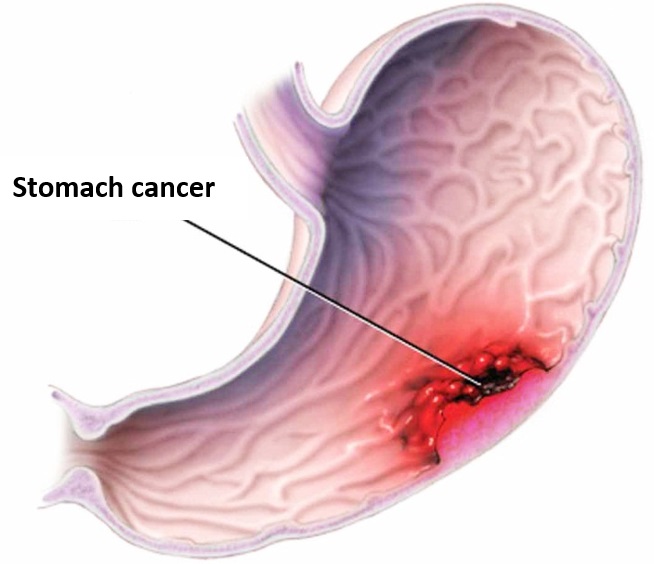
Stomach cancer happens when the replications of the cells overlying the stomach wall become uncontrolled or autonomous. It is the second highest cause of death from cancer in the world. In Malaysia it is the sixth commonest cancer among men and the tenth commonest cancer among women.
Incidence of stomach cancer is high in Japan as the population takes a lot of pickled and smoked food. There has been a decline in the incidence in Japan as there is better ways of storing the food with the availability of refrigerator thus less dependent on pickled and smoked food.
Majority of patients with stomach cancer are among those 65 years and above and it is more common among men than women.
Stomach cancer has a very high chance of cure rate if it is detected and treated early. Unfortunately patients commonly present late due to its subtle symptoms. It will be difficult to treat stomach cancer once it has metastasized to other organs.
Risk factors
Among the risk factors that predisposes to stomach cancer are
- Gender
Men are at higher risk of developing stomach cancer than women. Twice the risk among men - Age
Majority of stomach cancer occurs in the elderly age group with higher risk among those above 60 years of age. - Race
According to the statistic by National Cancer Institut of Malaysia in 2006, the incidence of stomach cancer is higher among chinese at 61.7%, followed by malays 25.9% and Indians 12.4%. - Helicobacter pylori infection
Helicobacter pylori infection is one of the predisposing factors for stomach cancer and it is prevalent among these patients. However not all patients with Helicobacter pylori infection will develop stomach cancer. - Smoking
Smoking is associated with twice higher risk of getting stomach cancer. - Diet
The risk for stomach cancer is higher among those with high intake of pickled, salted and smoked food. Diet with high fresh foods and vegetables may reduce the risk of stomach cancer. - Family risk
Those with family members diagnosed with stomach cancer have a higher risk compared to the general population especially the first degree family ie parents and siblings.
Symptoms
Stomach cancer may take a long period before it manifest. Early symptoms are subtle and majority of patients are asymptomatic. Sometimes these patients were initially treated like any other benign stomach diseases like peptic ulcer.
Difficult early detection causes majority of cases present at a very late stage of the disease.
Some of the common symptoms associated with stomach cancer are
- Indigestion
- Epigastric discomfort
- Epigastric pain
- Nausea and vomiting
- Difficulty to swallow food
- Bloatedness especially after meal
- Blackish stool
- Haematemesis or vomiting blood
- Loss of appetite
- Loss of weight
- Lethargy
- Palpable mass in the abdomen
- Lymph node enlargement
Treatment
Before any treatment stomach cancer needs further evaluation for proper staging of the disease. This requires endoscopic assessment, tissue biopsy and CT scan of the abdomen. Generally treatment of stomach cancer consist of surgery, chemotherapy and/or radiotherapy depending on the stage of the disease.
In the early stage stomach cancer can be treated with endoscopic resection. However majority of patient may require surgery that entails resection of no less than two third of the stomach or all of it. This will also include all the lymphatic tissue adjacent to the stomach. If the cancer is in advanced stage rarely surgery will be required accept to palliate the symptom of obstruction and this is no longer a curative surgery.
Radiotherapy for stomach cancer uses high radiation to kill the cancer cells. Radiotherapy can be used preoperatively to downsize the tumor before surgery can be done. This is called neoadjuvant radiotherapy. Radiotherapy can also be given postoperatively to kill any residual cancer cells. This type of treatment is often combined with chemotherapy.
Chemotherapy is used either before or after the surgery depending of the staging of the cancer. Radiotherapy is usually added to chemotherapy after surgery for a locally advanced stomach cancer.
References
- http://www.mayoclinic.org/diseases-conditions/stomach-cancer/basics/definition/con-20038197
- http://www.webmd.com/cancer/stomach-gastric-cancer
- Orditura, M., Galizia, G., Sforza, V., Gambardella, V., Fabozzi, A., Laterza, M. M., … & De Vita, F. (2014). Treatment of gastric cancer. World journal of gastroenterology: WJG, 20(7), 1635.
- Jemal, A., Bray, F., Center, M. M., Ferlay, J., Ward, E., & Forman, D. (2011). Global cancer statistics. CA: a cancer journal for clinicians, 61(2), 69-90.
- http://www.hmetro.com.my/myMetro/articles/Minda – Petunjuk awal kanser perut
- http://emedicine.medscape.com/article/278744-overview
| Last Reviewed | : | 23 November 2015 |
| Translator | : | Dr. Mohamad Shukri b. Jahit |
| Accreditor | : | Dr. Salina bt. Ibrahim |







